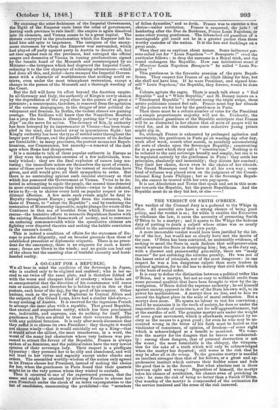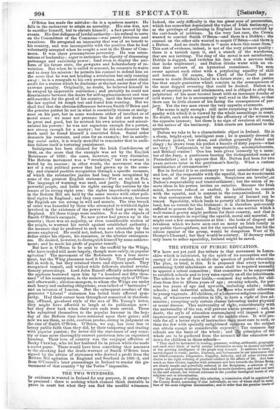THE VERDICT ON SMITH O'BRIEN.
THE verdict of the Cloninel Jury is a godsend to the Whigs in office. All merciful acts have a strong chance of being good policy, and the verdict is so ; for while it enables the Executive to vindicate the law, it saves the necessity of promoting Smith O'Brien to be a martyr ; and it spares to the Whigs the hideous duty of putting to death a culprit whose crime was so nearly allied to the antecedents of their own party. A more inexorable verdict would have been justified by the let- ter of the law, but would not so closely have met the merits of the case. O'Brien has been convicted, on undeniable evidence, of seeking to assail the State in such fashion that self-preservation would warrant the State in destroying him ; but, as the Jury say, with a discreet and praiseworthy generality, there are "many reasons " for not enforcing the extreme penalty. He was not of the basest order of criminals, nor of the most dangerous : in one respect he was a less dangerous culprit than mere traders in political agitation, for he did less to destroy that civil faith which is the basis of social order.
It is easy to define the distinction between a political trifler like O'Brien, and a martyr, but not so easy to withhold credit from some personal qualities that have been brought to view by the in- vestigation. O'Brien defied the supreme authority ; he set himself against society, opposed to the law of the State his own will, to its power his machinations. A martyr does no less, and to him we accord the highest place in the scale of moral estimation. But a martyr does more. He spares no labour to teat his conviction ; and if he maintains it in the teeth of society, he does so under the imperative dictate of conscience, not for self-aggrandizement, but at the sacrifice of self. The genuine martyr acts under the weight of some great movement, which is afterwards recognized by so- ciety as the means to a great good ; for even he who may be ac- counted wrong in the letter of his 'faith must be hailed as the vindicator of conscience, of opinion, of freedom—of some right which is acknowledged as a benefit to mankind. We vene- rate the martyr for the dangers that he braves so undaunted- ly: among those dangers, that of personal destruction is not the worst ; the most formidable is the obloquy, the vitupera- tion for the sake of a truth which will only be acknowledged when the martyr has departed ; still worse is the risk that he may be after all in the wrong. To the genuine martyr is needful an intellect stronger than that of his fellows, or a great and ap- prehensive instinct which outruns their feebler sense and feels the good that is in the future. But what absolute test is there between right and wrong ? Regardless of himself, the martyr takes his chance of retribution, his chance even of perishing in vain : he runs the risk of being no better than a Smith O'Brien. Our worship of the martyr is compounded of the estimation for the service rendered and the sense of the risk incurred. O'Brien has made the mistake—he is a spurious martyr. He falls in the endeavour to attain an unreality. His aim was, not to sacrifice himself, but to elevate himself; a fact proved by the events. His first defiance of lawful authority—his refusal to serve on the Committees of the Commons—was purely frivolous and vexatious. He arrogated an immunity that was of no benefit to his country, and was incompatible with the position that he had voluntarily accepted when he sought a seat in the House of Com- mons. It was sheer presumptuous perversity. He was osten- tatious of leadership ; eager to anticipate the dignity of dispensing patronage and exercising power ; fond even to display the uni- form of his future state, the gewgaws and haberdashery of re- volution. But when he is called to account, he consents to waive and to deny his mission : he permits his counsel to defend him on the score that he was not heading a revolution but only running away : he is a renegade to his own pretensions, and cannot claim credit for a station which he disclaims at the last under fear of the extreme penalty. Originally, no doubt, he believed himself to be swayed by imperative conviction ; and probably he could not discriminate between the desire for self-aggrandizement and true self-sacrifice for the good of his country, until the fatal terror of the law applied its rough test and found him wanting. But we shall find that the obvious differences between Smith O'Brien and the genuine patriot lie not in what is essentially vicious or malig- nant on his part, but in some weakness either of intellect or of moral sense: we must not presume that be did not desire to be great and good, but he mistook his own mission and miscal- culated his powers : he was not sagacious enough for a patriot, nor strong enough for a martyr ; but he did not discover that truth until he found himself a convicted felon. Social order demands his restraint, and cries for an example; but in satisfy- ing social order, it is wisely merciful to remember that to ambi- tion failure itself is torturing punishment.
Indulgence has been claimed for the Irish Confederates of 1848, on the score that the example was set by the Enalish Reformers of 1832: the cases, however, are very dissimilar. The Reform movement was a "revolution," but its warrant is tested by its success : in other words, the movement was the act of a real political power that had grown up in the coun- try, and claimed positive recognition through a specific measure, of which the substantive justice had long been recognized by some of the greatest English statesmen—Pitt as well as Fox. The language of warning was used, and justly. England is a powerful people, and holds its rights among the nations by the tenure of its strong right arm : the rights imperfectly embodied in the Reform Bill are held by the same tenure with other poli- tical rights in England ; and they cannot be taken away, because the English are too strong in will and muscle. The true breach of order was hazarded by those who attempted to withhold rights involved in the existence of the power which had grown up in England. All these things were realities. Not so the objects of Smith O'Brien's escapade. No new power had grown up in the country ; there was no majority, or even considerable section of the people, to warrant his revolt against established authority ; the measure that he professed to seek was not attainable by the means employed. He could not, indeed, have taken the pains to define either his objects, his resources, or the ulterior consequen- ces. He desired, however, to distinguish himself by some achieve- ment; and he made his profit of popular tumult.
But how is O'Brien to be sent to the scaffold by the Whigs, who have traded still more largely, though more safely, in popular agitation ? The movement of the Reformers was a true move- ment, but the Whig placemen used it falsely. They professed to fall in with it, but they retained views and objects apart. They recognized tumult, and winked while followers abetted revolu- tionary proceedings. Lord John Russell officially acknowledged the applause bestowed upon him by "a hundred and fifty thou- sand" of his countrymen, in the monster-meeting style of O'Con- nell afterwards ; election-mongers, to whom the Whigs are under such heavy and enduring obligations, even talked of" barricades" and an invasion of London. But the subsequent conduct of the genteeler " Liberal " statesmen has belied their affected sym- pathy. Had their career been throughout conceived in the dash- mg, offhand, go-ahead style of the sera of Mr. Young's letter, they might have afforded to laugh at its publication now : but they drew back when their own ends were served. Those who submitted themselves to the popular humour in the hey, day of the Reform time have retreated upon their gains; and now we see them, as cold, cautious prudes, sitting in judgment on the sins of Smith O'Brien. O'Brien, we say, has done less to betray public faith than they did, by their tampering and trading with popular passion; for never did the statesmen of any coun- try or time more thoroughly convert patriotism into an organized humbug. Their love of country was the conjugal affection of Becky Crawley, who let her husband lie in prison while she made a secret purse. There would have been something that amounts to the shocking had the death-warrant of Smith O'Brien been Signed by the advice of statesmen who derived a profit from the Reform Bill agitation in England and Scotland in 1831-2, and from O'Connell's later proceedings in Ireland to render the go- vernment of that country "by the Tories" impossible.



























 Previous page
Previous page